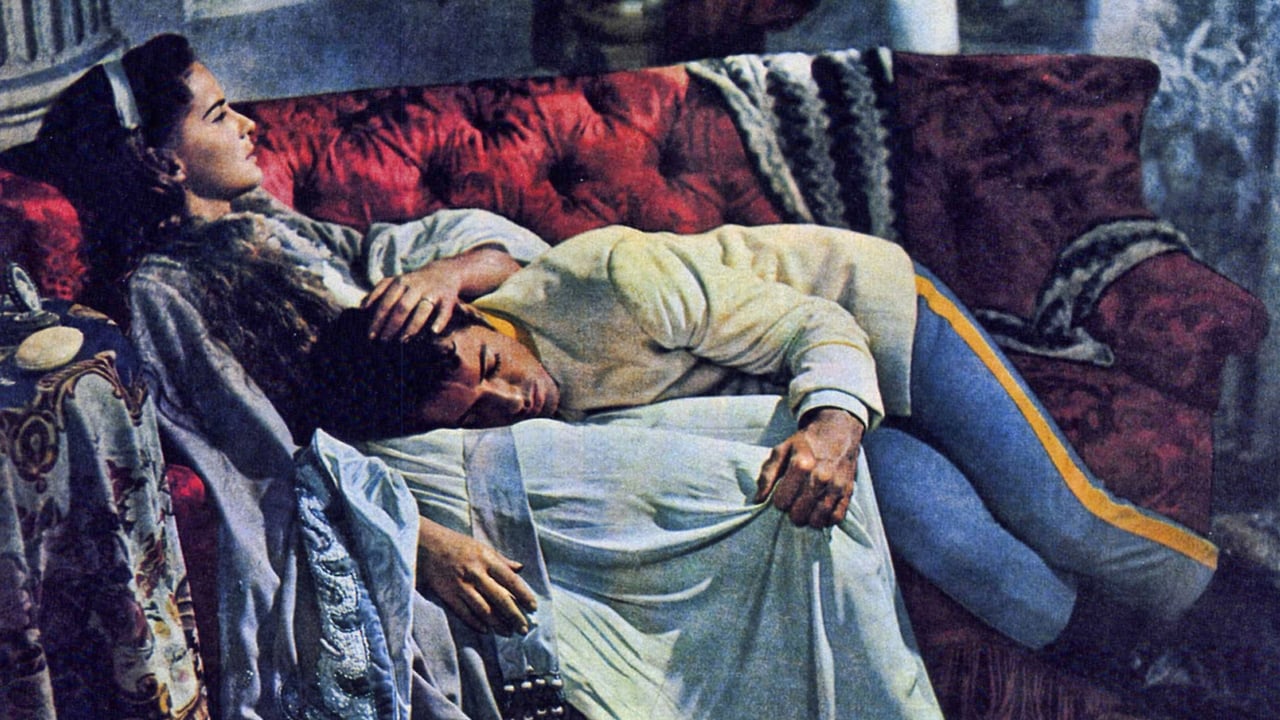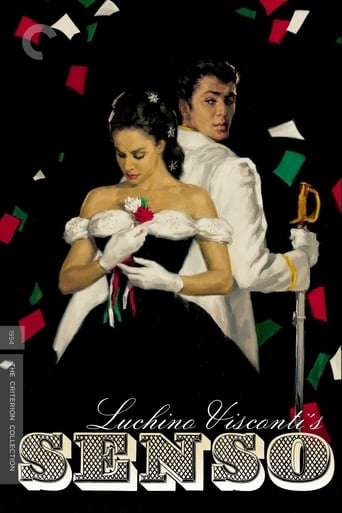



Just so...so bad
Horrible, fascist and poorly acted
Each character in this movie — down to the smallest one — is an individual rather than a type, prone to spontaneous changes of mood and sometimes amusing outbursts of pettiness or ill humor.
View MoreIt’s fine. It's literally the definition of a fine movie. You’ve seen it before, you know every beat and outcome before the characters even do. Only question is how much escapism you’re looking for.
View More'Senso' directed by Italian master Luchino VIsconti marked his first departure from neo-realism. This is a grand operatic romance which manages to tie in a social and political subtext with it. From a visual standpoint, this is one of the most beautiful films I have ever seen. Right from the first shot to the final one, the film remains colourful and visually vibrant which is enhanced by Visconti and his cinematographer's exquisite framing and compositions. The film has a melodramatic/operatic tone to it. 'Senso' falls in line with a number of other films made during this era of the 50s all around the world that came to be known as 'Women's Films'. These movies generally were melodramas with a female protagonist having to go through tough times and even tragedies for the sake of love and romance. 'Senso' with its melodrama and visual flair reminded me of the Douglas Sirk films. But more than Sirk, the name that constantly came across my mind Max Ophüls. I couldn't help but find similarities with 'The Earrings of Madame de ' due to the film revolving around aristocracy, opulence as well as having a protagonist who is an older mature woman engaging in infidelity. 'Senso' has a rich political and social context. It is set at a specific moment in Italian history when the Austrian occupation of Venice was about to face violent rebellion from native Venetians who were fighting for liberation from Austria and merging of Venice with Italy. The central characters and the illicit romance in the film go hand in hand with the politics and nationalist movement which reminded me of Satyajit Ray's 'The Home and the World'. On a broad level, 'Senso' seems to be a sensitive, but at the same time scathing criticism of the aristocracy and the upper class. Livia betraying her rebel cousin Roberto just for the sake of her love/lust for the Austrian officer Franz has to symbolise the rich, upper class and the aristocracy turning their back on the ideals and ideology of the nationalist movement. On the other hand, based on a more personal reading, the film seems to be about identity and the idea of compromising your morals and ideals for selfish desires. There are mirrors visible in many shots of the film and there is a scene where Franz actually talks about how he likes to look at himself in the mirror to see whether he is still the man that he was earlier. We see Livia going through a constant fight within herself to decide whether she to stick to her morals and nationalistic ideals or give in to the charm and her yearning for Franz, the Austrian officer. She gives in to her yearning and betrays her ideals. But in the end, she gets a taste of her own medicine when Franz becomes nothing short of a mirror image of her own betrayal and selfishness.In a film where the main characters aren't the most likable, the actors have to really rise to the top and make the characters really interesting. Farley Granger is good as the cunning and charming Franz. But the film is carried by Alida Valli. She made me believe Livia's attraction toward Franz. Yes she is exaggerated in some of her expressions, but it fits perfectly with the melodramatic tone of the film. 'Senso' wouldn't completely work without Alida Valli's brilliantly emotive performance.'Senso' is a lavish, sprawling, epic romance with a political subtext. It is a very well made, well acted and thematically deep film that I'd most certainly recommend.
View MoreIn this film, Visconti not only brought a lavish attention to historical detail, but he also put forward the ideologically challenging idea that human erotic passions (in particular, Alida Valli's grand passion) could take center stage and even upstage the unfolding of Il Risorgimento, the series of wars that Italians celebrate as laying the foundation for the creation of the Italian State. The scenes showing a demoralized Italian (read: "piemontese") army, in retreat (Custoza, 1866) in the face of yet another Austrian counter-offensive, were too much for the censors: as a vindication of Italian honor, they insisted that the film include the execution of Mahler. But Visconti was clearly in the camp of those who rejected military events, victorious or otherwise, as the cornerstone of Italian national identity. Forget the Veneto, and make love instead, seemed to be the hidden message.
View MoreI have rated this film 9 because of it's length, there are some ponderous moments, but otherwise it is a 10. Italian cinema was still having growing pains from the war, but this epic succeeds, and skillfully incorporates the war torn landscape into this tale of an earlier war. The music score is very big and melodramatic, but fitting. The film opens with an opera in an enormous opera house, and this is fitting for the grand scale and operatic scope of this romance and the background. This is "Gone With the Wind" - Italian style - with a much more sympathetic heroine.I am a fan of Alida Valli and have sought out her work. Perhaps because this is in her native Italian, and/or because of her Italian director, she is a full, vital, feminine woman in this film; very different from her more restrained work in America. (Her breathtaking performance in "The Paradine Case" is a study in austerity and an almost masculine stillness.) I had hoped that we would see a more free actress in her native language, and we do! She flutters and tosses her hair, she is a Countess reveling in her earthy affair. This is a full bodied performance.Farley Granger's performance, whether in response to Valli, or just given a really meaty bad-boy to play, is a total revelation. He is lusty and sexy, provocative, pouty and passionate. In one scene, he greets her by wordlessly grabbing her hand and almost devouring it with kisses. This is a rare film where both the woman AND the man have real powerhouse roles. The confrontation scene at the end is gripping.A small but pivotal role is played by Marcella Mariani. Her cow-like leadenness, laced with sisterhood, bespeaks a worldliness that, paired with her ethereal youthful beauty is just wrenching. All supporting roles, especially the maids, are interesting and give a sense of intrigue throughout.A previous reviewer mentioned that the outcome of a major plot point is cut out, which leaves you wondering... "but what happened with that?" Still, the major story is the romance, which I think will be satisfying for men as well as women, because both sides are given such full emotional life. IF YOU CAN FIND IT, it is an enjoyable, big emotion, epic wartime romance.
View MoreWonderful movie, and quite unexpected at the time from the neorealist Visconti, finally letting some of the operatic juice flow into his film work. It's also the first of his explorations of Italian history and social change, to be followed by The Leopard and the fantastic Rocco and His Brothers.One caveat: At a screening a couple of years ago at MoMA, I learned that it was the Italian government that was responsible for the snipping of some crucial scenes near the end of Senso, depicting the Battle of Custozza. These were meant to make his critique of the Italian ruling classes and their failure to pull together during this period of the risorgimento more explicit. But apparently the Italian government, fresh from defeat in WW II, didn't like the idea of a major movie showing an Italian army being beaten. So the episode was truncated, leaving a few people scratching their heads about what the point of it all was. Poor Visconti tended to make long movies, and often had trouble getting them shown at the proper length in the US, but this time it was his own government that stymied him!As for the rest: Granger is fine, but it's Valli who gives one of the all-time great move star performances. What a great face! The story is written on it, and the director wisely keeps her the focus of attention.
View More